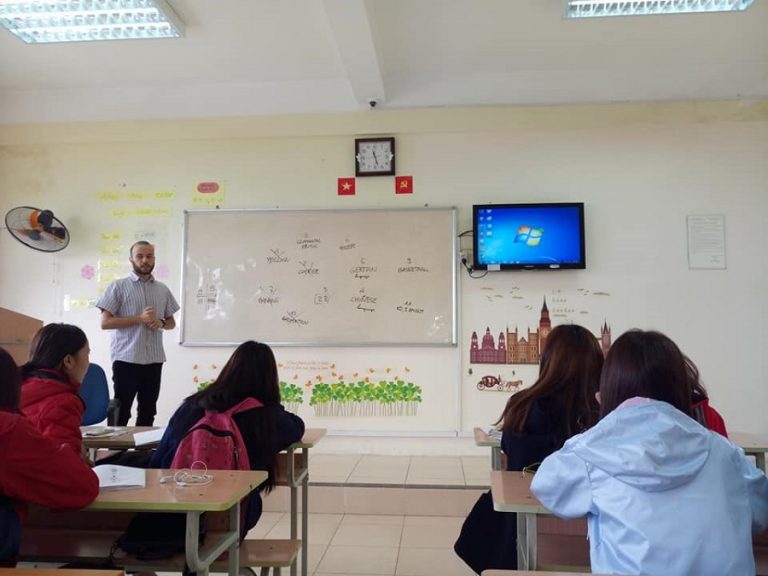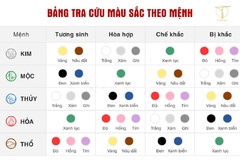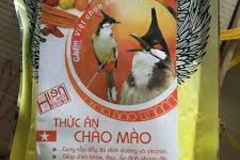Học tiếng Anh du lịch hiệu quả: Các phương pháp và tài liệu hữu ích
Một số mẫu câu tiếng Anh du lịch thông dụng tại sân bay

Mẫu câu đặt vé máy bay:
- I'd like to book a one-way ticket to London, please.
- How much is a round-trip ticket to New York?
- Can I change my return date if needed?
Mẫu câu làm thủ tục tại quầy check-in:
- Can I have your passport and boarding pass, please?
- Is there any baggage I need to check in?
- What gate is my flight departing from?
Mẫu câu thông báo chuyến bay:
- This is the final call for passengers on flight FH456 to Tokyo.
- The departure of flight AB123 has been delayed. We apologize for the inconvenience.
- Boarding for flight KL789 will begin in 15 minutes.
Mẫu câu hỏi và trả lời tại quầy thông tin:
- Excuse me, where can I find the currency exchange?
- Can you tell me where the restrooms are?
- Is there a shuttle bus to the city center?
Một số mẫu câu tiếng Anh cần thiết trong quá trình đi du lịch
Mẫu câu đặt phòng khách sạn:
- Do you have any rooms available for tonight?
- How much is a single/double room per night?
- Can I request a non-smoking room?
Mẫu câu đặt món ăn trong nhà hàng:
- I'd like to order the chef's special, please.
- Can I have the menu, please?
- Is there a vegetarian option available?
Mẫu câu hỏi đường đi:
- Excuse me, how do I get to the nearest train station?
- Is there a map of the city available?
- Which bus should I take to go to the museum?
Mẫu câu mua sắm:
- How much does this souvenir cost?
- Do you accept credit cards?
- Is there a discount for buying multiple items?
Tư vấn ngay 1. Mẫu câu tiếng Anh du lịch cấp tốc dùng tại quầy vé sân bay

Mẫu câu hỏi về hành lý:
- How many bags can I check in?
- Is there a weight limit for carry-on luggage?
- Can I bring my laptop in my hand luggage?
Mẫu câu đổi ngôn ngữ:
- Do you speak English?
- I'm sorry, I don't understand. Can you say that again?
- Can you help me translate this phrase into English?
Mẫu câu hỏi về chuyến bay:
- What time is the flight to Sydney?
- Can I have a window seat, please?
- Is there any in-flight entertainment?
Mẫu câu thông báo thời gian chờ:
- The flight is delayed by two hours due to bad weather.
- We apologize for the inconvenience, but your flight has been cancelled.
- There will be a layover of one hour in Dubai.
Từ điển từ vựng tiếng Anh chuyên ngành du lịch
Từ vựng về địa điểm:
- Beach: bãi biển
- Temple: đền
- Museum: bảo tàng
Từ vựng về phương tiện:
- Taxi: taxi
- Bus: xe buýt
- Train: tàu hỏa
Từ vựng về khách sạn:
- Reception: quầy lễ tân
- Room service: dịch vụ phòng
- Wi-Fi: mạng không dây
Từ vựng về thời gian:
- Morning: buổi sáng
- Afternoon: buổi trưa
- Evening: buổi tối
Một số thuật ngữ tiếng Anh chuyên ngành du lịch

Thuật ngữ về chuyến du lịch:
- Itinerary: lịch trình
- Tour guide: hướng dẫn viên du lịch
- Sightseeing: tham quan
Thuật ngữ về đặt phòng khách sạn:
- Reservation: đặt chỗ
- Check-in: nhận phòng
- Check-out: trả phòng
Thuật ngữ về hành lý:
- Baggage: hành lý
- Carry-on: hành lý xách tay
- Lost and found: đồ thất lạc
Thuật ngữ về mua sắm:
- Souvenir: quà lưu niệm
- Bargain: mặc cả
- Cashier: thu ngân
Những cụm từ vựng tiếng Anh chủ đề du lịch
Các cụm từ về đặt phòng và nhận phòng khách sạn
When traveling, one of the most important things to do is to book a hotel room. Here are some useful English phrases and vocabulary related to hotel reservations and check-in:
- Room reservation: To reserve a room in advance, you can use phrases such as "I would like to book a single/double room for two nights" or "Can I make a reservation for [date]?"
- Check-in: When arriving at the hotel, you can say "I have a reservation under [name]" or "I would like to check-in". The receptionist will then ask for your identification and may request a credit card for any potential additional charges.
- Hotel facilities and services: If you have any specific requirements or questions about the hotel facilities, you can ask "Does the hotel have a gym/pool/restaurant?" or "Can you recommend any nearby attractions?".
- Early check-out: If you need to leave before the standard check-out time, you can inquire about early check-out options by saying "I need to check out early tomorrow morning, is that possible?"
Các cụm từ liên quan đến hướng dẫn du lịch
When visiting a new destination, you may need to ask for directions or information about tourist attractions. Here are some useful English phrases for tourist guidance:
- Asking for directions: If you are lost and need directions, you can say "Excuse me, could you please tell me how to get to [destination]?" or "Is there a landmark or specific street I should look for?".
- Guided tours: If you're interested in taking a guided tour, you can ask "Are there any guided tours available for [attraction]?" or "How can I join a guided tour?".
- Opening hours: When inquiring about the opening hours of a museum, attraction, or restaurant, you can ask "What are the opening hours of [place]?" or "When does [place] open/close?".
- Recommendations: If you need recommendations for places to visit or things to do, you can ask "What are the must-see attractions in this city?" or "Do you have any local recommendations for food?".
Một số tình huống giao tiếp tiếng Anh chuyên ngành du lịch
Tình huống đón tiếp khách du lịch
When working in the tourism industry, it is important to be able to communicate effectively with tourists. Here are some common situations and English phrases for welcoming and assisting tourists:
- Greeting: When greeting tourists, you can say "Welcome to [destination]!" or "Good morning/afternoon/evening, how can I assist you?". It is also polite to ask if they need any help with their luggage.
- Offering assistance: If tourists seem lost or confused, you can approach them and ask "Are you looking for something specific?" or "Can I help you with directions?". Offering a map or tourist brochure can also be helpful.
- Providing information: Tourists may have questions about local attractions, transportation, or dining options. You can provide information by saying "There is a bus station nearby that can take you to [attraction]" or "There are several restaurants within walking distance, would you like some recommendations?".
- Dealing with complaints: Unfortunately, there may be situations where tourists are dissatisfied. In such cases, it is important to remain calm and empathetic. You can apologize for any inconvenience and offer solutions such as a room change or a refund.
Tình huống giới thiệu văn hóa và lịch sử địa phương
Part of the travel experience is learning about the local culture and history. As a tour guide or travel professional, you may need to provide insights and information about the destination:
- Introducing landmarks: When presenting famous landmarks or historical sites, you can say "This is [landmark], which was built in [year]" or "This site holds great cultural significance for the local community".
- Explaining traditions: Tourists may be interested in local customs and traditions. You can provide information by saying "During [festival/celebration], locals engage in [activity/ritual]" or "In our culture, [custom] is considered important because [reason]".
- Sharing historical facts: Providing historical context adds depth to the travel experience. You can say "This city has a rich history dating back to [year/era]" or "During [event], significant changes occurred that shaped the city's development".
- Highlighting local cuisine: Food is often an important aspect of travel. You can introduce local dishes by saying "One popular traditional dish here is [dish name], made with [ingredients/technique]" or "If you're looking to try something unique, I recommend [specialty dish]".
Tìm hiểu về du lịch trong công việc tiếng Anh
Tầm quan trọng của ngành du lịch
The tourism industry plays a crucial role in global economies and provides various job opportunities. Understanding the importance of tourism in the workforce is essential:
Tourism contributes to economic growth by generating revenue through visitor spending, creating jobs in industries such as hospitality, transportation, and entertainment. It also promotes cultural exchange and fosters a better understanding among different nations and cultures.
Within the field of tourism, there are diverse career options, including tour guides, hotel management, event planners, travel agents, and customer service representatives. These jobs require language skills, cultural knowledge, and the ability to provide excellent customer service.
Moreover, the tourism industry offers opportunities for entrepreneurs to start their own businesses, such as opening a boutique hotel, starting a tourism consulting firm, or organizing specialized tours.
Các kỹ năng cần thiết trong ngành du lịch
To succeed in the tourism industry, there are certain essential skills that professionals should possess:
- Language proficiency: Fluency in multiple languages, including English, is highly beneficial in communicating with international tourists.
- Cultural awareness: Understanding and appreciating different cultures enables professionals to provide personalized experiences for their guests.
- Customer service skills: Being able to anticipate and exceed customer expectations is vital in delivering exceptional service and creating positive experiences for tourists.
- Problem-solving abilities: Quick thinking and adaptability are crucial when dealing with unexpected situations or addressing customer complaints.
- Networking and communication: Building relationships with industry partners, suppliers, and local communities can contribute to a successful tourism business.
- Marketing and sales: Knowledge of marketing strategies and sales techniques is essential for promoting destinations and attracting tourists.
Học tiếng Anh để đi du lịch

Lợi ích của việc học tiếng Anh trong du lịch
Learning English can greatly enhance the travel experience and open doors to new opportunities:
With English language skills, travelers can communicate more effectively with locals, ask for directions, and navigate transportation systems. It also allows for greater independence in planning itineraries, making hotel reservations, and reading signs and menus.
Furthermore, learning English enables travelers to connect with people from different cultures, fostering meaningful connections and cultural exchange. It provides a sense of confidence and adaptability when encountering unfamiliar situations or conversing with people from diverse backgrounds.
On a professional level, English fluency is advantageous for those working in the tourism industry, enabling them to communicate with international guests and expand their career prospects.
Cách học tiếng Anh cho du lịch
Here are some practical tips for learning English specifically for travel purposes:
- Vocabulary and phrases: Start by learning common travel-related words and phrases, such as greetings, directions, and ordering food.
- Listening and speaking practice: Improve your listening skills by watching English travel videos or listening to podcasts. Practice speaking by engaging in conversations with native speakers or joining language exchange programs.
- Study travel guides and brochures: Read travel guides and brochures in English to familiarize yourself with common travel vocabulary and gain insights about different destinations.
- Take language courses: Enroll in language courses or online platforms that offer travel-focused English lessons. These courses can provide structured learning and opportunities for practice.
- Immerse yourself in English-speaking environments: If possible, travel to English-speaking countries or participate in language immersion programs to fully immerse yourself in the language and culture.
- Utilize language learning apps: Make use of language learning apps and mobile dictionaries that provide travel-specific vocabulary and phrases.
Cách sử dụng tiếng Anh khi đi du lịch
Tại sân bay và trong phương tiện giao thông công cộng
When traveling, there are certain situations where English can be useful in communicating:
- At the airport: English can be helpful when checking in, asking about flight details, or inquiring about baggage regulations. Common phrases include "What is the departure/arrival time?" and "Where is the baggage claim area?".
- On public transportation: English phrases can be used for purchasing tickets, asking for directions, or confirming the next stop. Examples include "Is this the correct bus/train to [destination]?" and "How much is a ticket to [destination]?".
- When seeking assistance: If you need help or have any concerns, you can approach hotel staff, local authorities, or fellow travelers and ask questions like "Excuse me, can you help me find this address?" or "Is there a pharmacy nearby?".
- Ordering food: When dining at restaurants or street food stalls, English can be used to read menus, ask about ingredients, or place orders. Phrases like "Could you recommend a popular local dish?" and "I am allergic to [ingredient], is it used in this dish?" can be useful.
Các từ vựng cần biết khi đi du lịch

Khi đi du lịch, việc hiểu và sử dụng được một số từ vựng tiếng Anh cơ bản về du lịch sẽ giúp bạn giao tiếp dễ dàng hơn với người dân địa phương, nhân viên khách sạn và những người khác bạn gặp trong hành trình. Dưới đây là một số từ vựng cần biết khi đi du lịch:
1. Tiếng Anh du lịch hàng ngày:
- Greetings: Lời chào hỏi - Directions: Hướng dẫn đường đi - Transportation: Phương tiện giao thông - Accommodation: Nơi ở - Foods and Drinks: Đồ ăn và đồ uống - Shopping: Mua sắm - Sightseeing: Tham quan - Emergency: Trường hợp khẩn cấp
2. Tiếng Anh du lịch khách sạn:
- Hotel: Khách sạn - Reception: Quầy tiếp tân - Reservation: Đặt phòng - Check-in/check-out: Nhận phòng/Trả phòng - Room service: Dịch vụ phòng - Housekeeping: Dịch vụ vệ sinh phòng - Restaurant: Nhà hàng - Concierge: Nhân viên lễ tân
3. Tiếng Anh du lịch đi đường:
- Map: Bản đồ - Signpost: Chỉ dẫn giao thông - Intersection: Ngã tư - Roundabout: Vòng xuyến - Pedestrian: Người đi bộ - Crosswalk: Vạch dành cho người đi bộ - Traffic jam: Tắc đường - Toll gate: Cổng thu phí
4. Tiếng Anh du lịch mua sắm:
- Market: Chợ - Souvenir: Quà lưu niệm - Bargaining: Mặc cả - Cashier: Thu ngân - Receipt: Biên lai - Discount: Giảm giá - Size: Kích cỡ - Color: Màu sắc
Kỹ năng ngôn ngữ cần có để du lịch tiếng Anh
Khi đi du lịch tiếng Anh, việc sử dụng các kỹ năng ngôn ngữ cơ bản sẽ giúp bạn tương tác và giao tiếp một cách hiệu quả với người dân địa phương và những người khác bạn gặp trên đường. Dưới đây là những kỹ năng ngôn ngữ cần có khi đi du lịch tiếng Anh:
1. Nghe:
- Lắng nghe hiểu đúng ý nghĩa của câu hỏi hoặc đề nghị. - Hiểu được thông tin cơ bản về địa điểm du lịch, nơi ở, giao thông và mua sắm. - Hiểu được hướng dẫn đường đi và chỉ dẫn từ người địa phương.
2. Nói:
- Giao tiếp cơ bản với người dân địa phương, nhân viên khách sạn, nhân viên nhà hàng và những người khác bạn gặp trong hành trình du lịch. - Đặt câu hỏi và yêu cầu thông tin liên quan đến du lịch, nơi ở, ăn uống và mua sắm. - Thể hiện ý kiến và cảm nhận về những trải nghiệm du lịch của bạn.
3. Đọc:
- Đọc được thông tin cơ bản về địa điểm du lịch, thông báo giao thông và biển chỉ dẫn. - Đọc được menu, biểu đồ và bảng giá ở nhà hàng, quầy bar và cửa hàng. - Hiểu được nội dung văn bản hướng dẫn và quy định khi du lịch.
4. Viết:
- Gửi email hoặc tin nhắn đặt phòng và hỏi thông tin trước khi đến địa điểm du lịch. - Viết các ghi chú và hướng dẫn nhỏ cho bản thân khi đi du lịch. - Viết các phản hồi, đánh giá và bình luận về những trải nghiệm du lịch của bạn.
Kết luận
Tiếng Anh du lịch đóng vai trò quan trọng trong việc giao tiếp và tương tác với khách du lịch quốc tế. Việc nắm vững tiếng Anh du lịch giúp người công dân có thể truyền đạt thông tin, hướng dẫn và cung cấp dịch vụ dễ dàng cho du khách nước ngoài.
Ngôn ngữ tiếng Anh là ngôn ngữ phổ biến nhất trên thế giới và được sử dụng rộng rãi trong ngành du lịch. Việc nắm bắt ngữ cảnh, từ vựng và cấu trúc câu liên quan đến du lịch giúp du khách tận hưởng hành trình của mình một cách thuận lợi và dễ dàng.
Bên cạnh việc giao tiếp với du khách, tiếng Anh du lịch còn giúp người công dân nâng cao khả năng làm việc và tìm kiếm cơ hội trong ngành du lịch. Có thể nói, việc biết tiếng Anh du lịch không chỉ là một lợi thế mà còn là một yếu tố quan trọng để phát triển sự nghiệp trong lĩnh vực này.
Đối với du khách, việc học tiếng Anh du lịch sẽ giúp họ trải nghiệm tốt hơn khi đi du lịch. Nhờ có khả năng giao tiếp và hiểu biết về ngôn ngữ, du khách có thể tương tác với người địa phương, hòa nhập vào văn hóa địa phương và tìm hiểu sâu hơn về điểm đến của mình.
Tiếng Anh du lịch là một công cụ hữu ích cho cả người công dân và du khách. Việc nắm vững tiếng Anh du lịch không chỉ mang lại lợi ích cá nhân mà còn đóng góp vào việc phát triển ngành du lịch và quan hệ quốc tế.

Tầm quan trọng của tiếng Anh và mục tiêu của bài viết

Kỳ thi tiếng Anh không chỉ là một phần thi trong chương trình học mà còn là cánh cửa mở ra nhiều cơ hội trong sự nghiệp và học tập quốc tế. Với sự toàn cầu hóa và tầm quan trọng ngày càng tăng của tiếng Anh trong giao tiếp chuyên nghiệp, việc đạt điểm cao trong các kỳ thi tiếng Anh có thể tạo lợi thế cạnh tranh lớn cho các học sinh và người lao động trên toàn cầu.
Mục tiêu của bài viết này là cung cấp các mẹo và chiến lược thi tiếng Anh hiệu quả, giúp bạn không chỉ cải thiện điểm số mà còn nâng cao khả năng ngôn ngữ của mình. Chúng ta sẽ khám phá các phương pháp chuẩn bị, kỹ thuật làm bài, và cách thức để xử lý áp lực trong khi thi, nhằm giúp bạn tiếp cận kỳ thi một cách tự tin và chuẩn bị sẵn sàng đối mặt với mọi thách thức.
Bằng cách áp dụng những mẹo và chiến lược được trình bày, bạn sẽ có thể không chỉ đạt điểm cao hơn trong các bài thi tiếng Anh mà còn phát triển kỹ năng ngôn ngữ lâu dài, hỗ trợ cho sự nghiệp học tập và làm việc quốc tế của mình.
Chuẩn bị trước khi thi

Chuẩn bị hiệu quả cho kỳ thi tiếng Anh không chỉ là về mặt kiến thức mà còn về kỹ năng ứng dụng. Dưới đây là các bước cụ thể giúp bạn tăng cường khả năng và sự tự tin trước khi bước vào phòng thi:
Ôn tập ngữ pháp và từ vựng:
- Ngữ pháp: Đây là nền tảng của tiếng Anh, và bất kỳ sai sót nào cũng có thể ảnh hưởng đến điểm số của bạn. Hãy dành thời gian ôn tập các cấu trúc ngữ pháp chính và luyện tập chúng qua các bài tập.
- Từ vựng: Mở rộng vốn từ là chìa khóa để hiểu và thể hiện ý tưởng một cách rõ ràng. Sử dụng các ứng dụng học từ vựng, thẻ ghi nhớ và đọc báo tiếng Anh để làm quen với từ mới.
Luyện nghe và phát âm:
- Kỹ năng nghe: Luyện nghe thường xuyên qua các bản tin, podcast, hoặc xem phim tiếng Anh với phụ đề. Điều này giúp bạn cải thiện khả năng phân biệt âm và ngữ điệu, từ đó nâng cao hiểu biết về ngôn ngữ.
- Phát âm: Thực hành phát âm đúng là rất quan trọng, đặc biệt nếu kỳ thi của bạn có phần thi nói. Sử dụng các tài nguyên trực tuyến và ghi âm giọng nói của bạn để phân tích và cải thiện.
Kỹ năng đọc hiểu:
- Tăng tốc độ đọc: Thực hành đọc nhanh mà không mất đi sự chính xác là kỹ năng quan trọng, giúp bạn tiết kiệm thời gian trong phần thi đọc hiểu.
- Phương pháp đọc: Áp dụng kỹ thuật đọc như skim (đọc lướt) và scan (đọc tìm thông tin cụ thể) để nhanh chóng tìm được thông tin cần thiết trong bài đọc.
Kỹ thuật làm bài thi

Khi đã vào phòng thi, việc áp dụng những kỹ thuật thi cụ thể và hiệu quả sẽ giúp bạn tối đa hóa điểm số. Sau đây là một số kỹ thuật thi mà bạn nên thực hiện:
Quản lý thời gian:
- Chiến lược phân bổ thời gian: Để đảm bảo bạn có đủ thời gian cho các phần khó hơn, hãy phân chia thời gian cụ thể cho từng phần của bài thi. Bắt đầu với các câu hỏi bạn cảm thấy dễ nhất để nhanh chóng giành được điểm.
- Giám sát thời gian khi làm bài: Luôn giữ ý thức về thời gian còn lại trong suốt quá trình làm bài. Điều này giúp bạn cân bằng giữa việc hoàn thành bài thi và dành thời gian để kiểm tra lại các câu trả lời.
Kỹ thuật trả lời câu hỏi trắc nghiệm:
- Loại trừ câu trả lời sai: Đối với các câu hỏi trắc nghiệm, hãy dùng phương pháp loại trừ để loại bỏ các phương án rõ ràng không đúng, từ đó tăng cơ hội chọn được câu trả lời chính xác.
- Đánh dấu câu hỏi để xem xét lại: Nếu bạn không chắc chắn về một câu hỏi nào đó, hãy đánh dấu và quay lại nếu còn thời gian sau khi đã hoàn thành các câu hỏi khác.
Viết luận và thực hành nói:
- Kỹ năng viết luận: Đảm bảo rằng luận điểm chính của bạn rõ ràng và được hỗ trợ bằng các dẫn chứng thuyết phục. Sử dụng các đoạn văn có cấu trúc tốt, bao gồm mở bài, thân bài, và kết luận.
- Kỹ năng nói: Trong phần thi nói, hãy tập trung vào việc phát âm rõ ràng và tự nhiên, duy trì sự liên kết giữa các ý. Thực hành trước với các chủ đề đa dạng để bạn có thể tự tin trình bày trong mọi tình huống.
Mẹo thi cụ thể
Để tối đa hóa hiệu quả khi thi tiếng Anh, việc áp dụng các mẹo thi cụ thể sẽ giúp bạn nâng cao khả năng của mình và đạt điểm số cao. Dưới đây là một số mẹo thi cụ thể mà bạn có thể thực hiện:
Sử dụng phương pháp ELI5 (Explain It Like I'm 5):
- Khi phải giải thích các khái niệm phức tạp trong bài thi nói hoặc viết, hãy cố gắng đơn giản hóa chúng như thể bạn đang giải thích cho một đứa trẻ 5 tuổi. Điều này không chỉ giúp người chấm thi dễ hiểu ý bạn hơn mà còn thể hiện khả năng bạn sử dụng tiếng Anh một cách tự nhiên và rõ ràng.
Luyện tập với đề thi mẫu:
- Thực hành là chìa khóa để thành công. Luyện tập thường xuyên với các đề thi mẫu để quen với định dạng và các loại câu hỏi thường gặp. Điều này giúp giảm bớt căng thẳng và tăng cường sự tự tin khi bạn thực sự bước vào phòng thi.
Cách xử lý áp lực và giữ tâm lý ổn định:
- Kỳ thi có thể gây ra nhiều áp lực, vì vậy việc giữ cho tâm lý ổn định là rất quan trọng. Hãy thực hiện các bài tập thở sâu, tập trung vào quá trình học tập chứ không chỉ là kết quả, và đảm bảo rằng bạn có đủ thời gian nghỉ ngơi và thư giãn trước ngày thi.
Áp dụng những mẹo này không chỉ giúp bạn đối phó hiệu quả hơn với kỳ thi tiếng Anh mà còn giúp bạn phát triển lâu dài các kỹ năng ngôn ngữ cần thiết cho sự nghiệp học tập và làm việc trong tương lai.
Sau khi thi
Sau khi hoàn thành kỳ thi tiếng Anh, việc đánh giá lại bài làm và chuẩn bị cho các bước tiếp theo là rất quan trọng. Dưới đây là những bước bạn nên thực hiện sau khi thi:
-
Đánh giá bài làm:
- Kiểm tra lại bài làm của bạn để xem bạn đã trả lời đúng các câu hỏi hay chưa và có mắc phải các lỗi ngữ pháp hay chính tả nào không.
- Phân tích những điểm mạnh và điểm yếu của bài làm của bạn, từ đó rút ra kinh nghiệm cho các kỳ thi sau.
-
Chuẩn bị cho các bước tiếp theo:
- Xem xét kết quả và quyết định các bước tiếp theo dựa trên điểm số và mục tiêu cá nhân của bạn.
- Nếu bạn chưa đạt được mục tiêu của mình, hãy tìm hiểu nguyên nhân và xem xét cách cải thiện kỹ năng của mình. Có thể bạn cần tham gia các khóa học, tìm kiếm nguồn tài liệu mới, hoặc tăng cường lịch trình học tập.
Việc đánh giá và học hỏi từ kỳ thi là quan trọng để bạn có thể phát triển và cải thiện kỹ năng của mình. Hãy dùng kết quả của mình như một cơ hội để tiếp tục phát triển và tiến bộ trong hành trình học tập của mình.








